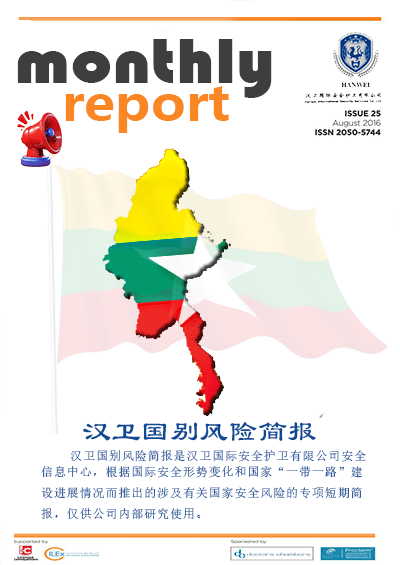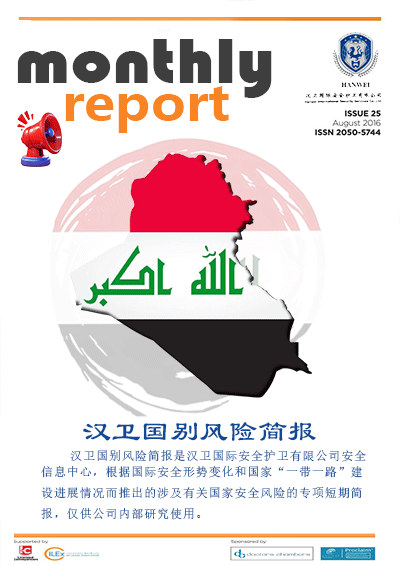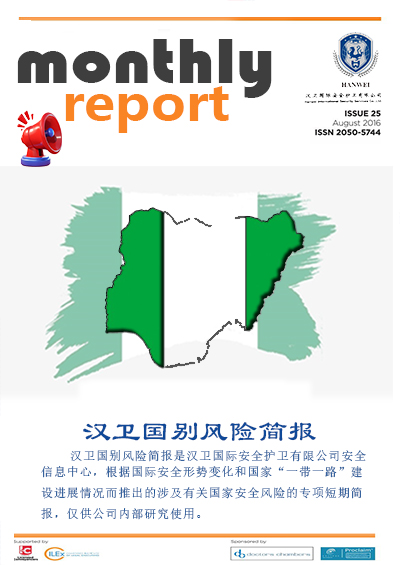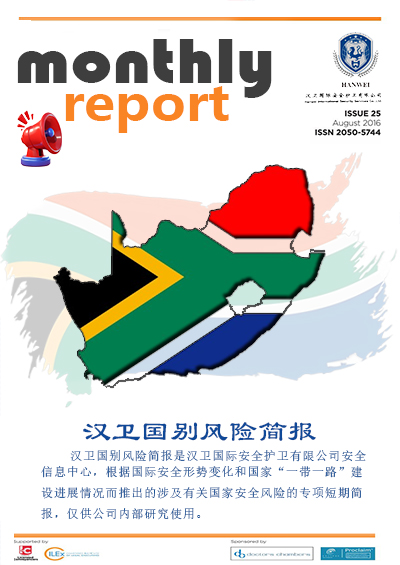Nigeria Social Security Situation Analysis - November 2024
Researcher No. 007

According to monitoring reports from Hanwei International's West Africa security officers and comprehensive media coverage, Nigeria recorded 63 security incidents in November 2024. These incidents resulted in 159 civilian deaths, 30 security personnel fatalities, and at least 133 kidnappings. The main types of incidents included armed attacks, kidnappings, farmer-herder conflicts, and public safety accidents. Compared to October, security incidents increased by 4, deaths decreased by 126, while kidnappings rose by 53. Analysis indicates Nigeria's security situation continues deteriorating, with persistent armed attacks/kidnappings including another Chinese national abduction on November 7. Concurrent public safety incidents (accidents, disease outbreaks) caused significant casualties and property damage, maintaining a complex and severe overall security environment. The north-central and central-south regions face extreme risks, while other areas remain high or medium-high risk.
I. Comprehensive Analysis of Security Incidents
Nigeria's 63 security incidents in November comprised: 29 armed attacks (46% of total), 17 kidnappings (26%), 7 public safety accidents (11%), 2 protests (3%), 6 herder-farmer conflicts (9%), and 2 military operations (3%). These incidents resulted in 201 deaths (159 civilians, 30 security personnel, 12 terrorists killed) and 133 kidnappings.
Key security characteristics:
(1) Extreme Risks in North-Central and Central-South Regions. Incidents concentrated in Kaduna, Katsina, Niger (north-central) and Benue, Abia, Enugu (central-south) states.
Kaduna State (north-central) recorded the highest risk with 6 incidents (10 deaths, 23 kidnappings). Benue State (central-south) had 5 incidents (48 deaths), mainly armed attacks and cult clashes. Katsina and Niger states (north-central) each recorded 4 incidents (5/25 deaths respectively, 37 kidnappings). Abia State (central-south) saw significant risk escalation with 4 attacks (5 deaths).
Additionally, Nigeria's Defense Headquarters confirmed on November 7 the emergence of new terrorist group "Lukarawas" in remote areas of Sokoto and Kebbi states (northwest). The Defense Ministry attributes this to regional instability following Niger's coup, which disrupted military cooperation between Niger and Nigeria, allowing terrorists to infiltrate through complex border terrain. On November 8, Lukarawas attacked Mera village (Kebbi State's Augie LGA), killing 15+ and stealing hundreds of cattle. The group has also occupied 5 LGAs in Sokoto State, extorting local residents. This new terrorist presence threatens to further destabilize northwest Nigeria.
Figure 1: Distribution Diagram of Security Incidents in November

Chart 1: Statistics of Security Incidents in Major Regions in November

(2) Armed Attacks and Kidnappings Remain Frequent. This month, Nigeria witnessed 29 armed attacks and 17 armed kidnappings, resulting in 151 deaths and 133 abductions. Notable incidents include: On November 2, suspected Fulani armed herdsmen attacked the Ayilamo community in the Logo Local Government Area of Benue State, killing 6 local residents and destroying numerous homes. On November 11, armed bandits raided a community in the Jema’a Local Government Area of Kaduna State, leaving 5 locals dead and several injured. Late on November 10, armed kidnappers attacked two communities in the Batsari Local Government Area of Katsina State, killing 2 residents and abducting at least 30 others. On November 16, the terrorist group Boko Haram assaulted a military camp in the Kareto town of the Gubio Local Government Area in Borno State, killing at least 5 soldiers and injuring several. On November 18, a team from the Nigeria Security and Civil Defence Corps (NSCDC) was ambushed by Boko Haram while repairing national power grid facilities in the Shiroro Local Government Area of Niger State, resulting in the deaths of 7 team members. From late November 24 to the early hours of November 25, suspected Fulani armed herdsmen attacked multiple villages in the Logo and Katsina-Ala Local Government Areas of Benue State, killing approximately 32 villagers. According to data released in November by the Nigerian security and intelligence firm BSIL, at least 971 people were kidnapped in Nigeria in October 2024, marking a 24.42% increase in kidnappings and a 51% rise in fatalities compared to the previous year. The northwestern region was the most affected, accounting for 83.83% of the national total. Facing this dire security situation, Nigerian President Tinubu stated in early November during the 9th convocation ceremony of the Federal University in Dutsinma, Katsina State, that he is committed to ending terrorism, banditry, kidnappings, and other criminal activities.
On November 11, the Chinese Embassy in Nigeria and the Consulate General in Lagos also issued safety advisories, urging Chinese enterprises and citizens in Nigeria to enhance security measures, remain vigilant about their surroundings, and be wary of suspicious individuals. They advised against unnecessary travel and, if going out, to avoid disclosing itineraries in advance while strengthening security arrangements. Nighttime and solo travel should be avoided, as well as visits to remote areas.
(3) Multiple China-Related Incidents Occurred. In November, several China-related incidents took place in Nigeria, severely impacting the safety of Chinese enterprises and nationals in the country.
First, on November 3, the Nigeria Police Force (NPF) and the National Cybercrime Center (NPF-NCCC) arrested 130 suspected cybercriminals, including 113 foreigners primarily from China and Malaysia. Authorities alleged their involvement in high-level cybercrimes, hacking, and activities threatening national security. On November 23, Justice Ekwete Akpan of the Federal High Court in Abuja ordered the detention of the 113 foreign defendants in Kuje and Suleja prisons. They face six charges, including cybercrime, money laundering, illegal stay, and unregistered business operations.
Second, around 5:20 PM on November 7, unidentified armed men wearing military camouflage forcibly stormed the Marksino Quarry Camp in Akamkpa Local Government Area, Cross River State, shooting a police officer and kidnapping two Chinese nationals and one Nigerian. Police cited a "security lapse" by guards at the gate, allowing the assailants to enter. Authorities are coordinating efforts to secure the hostages' release. Third, two Chinese nationals were arrested on November 9 for allegedly illegally exporting solid minerals. Fourth, Nigeria’s Economic and Financial Crimes Commission (EFCC) charged a Chinese national, surnamed Jin, with bribery and fraud in Lagos on November 14. The charges include retaining stolen property, bribery, theft, and fraudulently retaining a total of 301 million naira.
(4) Major casualties caused by public safety issues such as shipwrecks.
In November, another shipwreck occurred in Nigeria.On November 29th, a vessel carrying about 200 people capsized while traveling from Kogi State along the Niger River to Niger State, resulting in at least 27 deaths and over 100 people missing.
This month, Lassa fever and monkeypox outbreaks remain high in Nigeria.The Nigerian Centre for Disease Control and Prevention (NCDC) released the latest report on November 8th, showing that as of October 27, 2024, 132 local governments in 28 states of Nigeria have cumulatively reported 8,780 suspected cases of Lassa fever, 1,055 confirmed cases and 175 deaths. The case fatality rate (CFR) was 16.6%, slightly lower than 17.0% in the same period of 2023. In terms of the monkeypox epidemic, 72 local governments in 29 states of Nigeria have reported a total of 1,442 suspected cases and 118 confirmed cases of monkeypox, with no deaths.
In addition, in early November, two nationwide large-scale power outages occurred again in Nigeria.On November 5th, Nigeria's national power grid collapsed for the ninth time, causing a nationwide power outage. Ndidi Mba, the general manager of public affairs at Nigeria Transmission Corporation (TCN), said that the power outage was caused by tripping of multiple lines and generators. The power outage led to a standstill in economic activities, a shortage of drinking water and a rise in prices, seriously affecting people's lives.
(5) Continuously carry out military campaigns to clear and crack down on illegal and convicted activities.
In November, Nigerian security forces continued to carry out military clearance operations in the northeastern and central-southern regions. Since November, the military has intensified its patrol and inspection efforts in the Apouga area of Enugu Region to strictly prevent armed men from blocking the road and robbing. In addition, the military and police in Nigeria have intensified their crackdown on illegal oil refining and oil theft. On November 8th, the 6th Division of the Nigerian Army stationed at Port Harcourt announced that 700,000 liters of stolen petroleum products had been recovered from October 28th to November 3rd, 2024. At the same time, 29 illegal oil refineries were shut down, 24 suspects suspected of oil theft were arrested, and 14 vessels involved in crude oil theft were destroyed. In the River State, the military intercepted a large wooden ship carrying over 150,000 liters of stolen crude oil in the Kula area of the Akuku-Toru local Government District and seized storage tanks containing more than 2,500 liters of stolen crude oil. In Akhuibom State, the military intercepted two vehicles carrying illegally refined diesel and the drivers were detained. In Delta State, the police carried out multiple raids and seized a large number of pipelines used for oil transportation and other purposes.
Chart 2: Comparison of Security Incident Classifications in November

Chart 3: Classification Statistics of Deaths in November

Chart 4: Comparison of the Number of Major Security Incidents in November and October

Ii. Risk Early Warning and Prevention Suggestions
Chart 5: Recent Warning of Social Security Risks in Nigeria

Given the complex social environment and high-risk security assessment in Nigeria, the following security measures are recommended:
The first is to provide full-time security services during travel. In remote rural areas of Nigeria, the police force is limited and the road infrastructure is poor. As a result, the response of security forces to violent crimes and riots and conflicts is often seriously delayed. Therefore, Chinese-funded enterprises and others should promptly obtain the latest local security intelligence, conduct specific security assessments of the travel destinations, and have security personnel accompany and protect them.
The second is to pay attention to the risks of demonstrations and violent conflicts. Recently, several trade unions and organizations in Nigeria have announced that they will hold nationwide strikes and demonstrations in early December, increasing the risk of violent conflicts. On November 30th, the Nigerian Workers' Congress (NLC) announced strikes in 14 states and the Federal Capital Region (FCT) to protest the government's failure to implement the new minimum wage standard on time. The affected states include Kazina, Zamfarah, Cross River, Abia and so on.
Third, operate in compliance with local laws and regulations. In November, multiple incidents occurred in Nigeria where Chinese citizens were arrested for violating local laws. For this reason, it is reminded that enterprises and Chinese people in Nigeria should focus on legal operation, abide by the laws and regulations of Nigeria, and avoid getting involved in similar legal disputes and criminal cases.
Fourth, effectively avoid risks. Most of the attacks in Nigeria occurred in the northeastern and central-northern parts, especially in Maiduguri in the central part of Borno State, the roads connecting other major towns, the areas bordering Niger, and Zamfarah State. Recently, security incidents have occurred frequently in Kaduna State and Abuja. In the event of a terrorist attack, one should follow the official instructions and get in touch with their specific security service provider to receive timely assistance. Video surveillance is installed at the base, shops, warehouses and residences, and facilities such as trenches, high walls, barbed wire, anti-collision barriers, buffer zones and alarm systems are set up in the camps to strengthen military and police security forces and expand the defense range. At the same time, it is necessary to avoid lingering near areas that may become targets of armed attacks, including government and security force facilities, landmark buildings and religious sites, etc. In Nigeria, it is particularly important to minimize stays in densely populated public places such as the northeastern region, religious festival sites, areas where ethnic groups live together, regions with a high incidence of crime (especially highways and areas where piracy is active in the Gulf of Guinea), oil and gas facilities, government and military camp facilities, diplomatic embassies, religious worship places, schools, markets, refugee camps, bus hubs, and surrounding areas Time.




